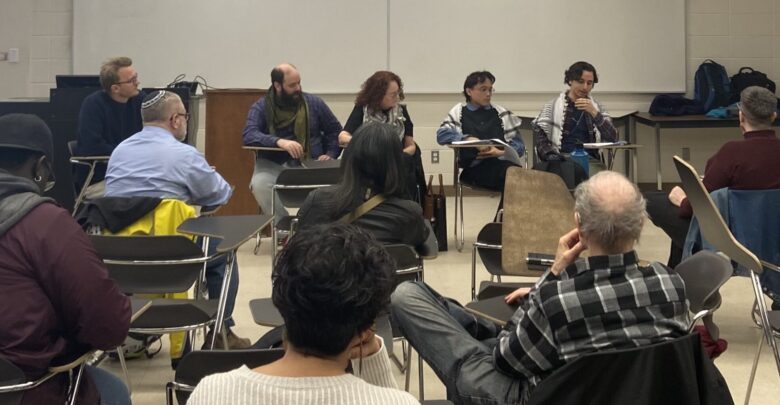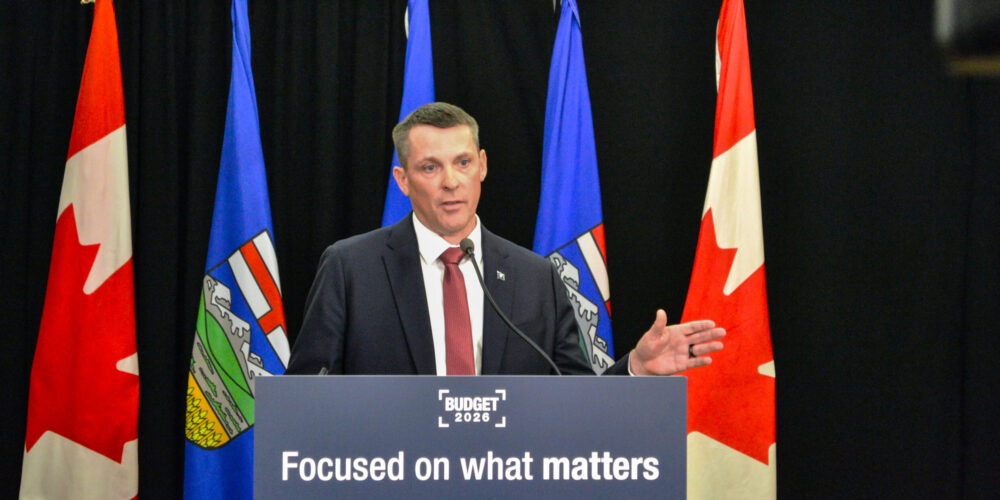U of A professor emerita releases analysis of third-party encampment review
The release was followed by an on-campus teach-in on the third-party encampment review.
 Kathryn Johnson
Kathryn JohnsonOn March 18, Laurie Adkin, professor emerita of political science at the University of Alberta, released a critical analysis of a third-party encampment review prepared for the U of A Board of Governors. The analysis was published by the Toronto Metropolitan University‘s Centre for Free Expression.
On May 11, 2024, the Edmonton Police Service (EPS) dismantled and removed a Palestine solidarity encampment from the U of A’s Main Quad at the request of the university. Several students and staff associations demanded a third-party investigation into the encampment removal. On July 2, BoG Chair Kate Chisholm stated that BoG commissioned an independent third-party review. Adèle Kent, retired Court of King’s Bench of Alberta Justice, was chosen to conduct the review.
In her analysis, Adkin argued that Kent’s report justified the university’s “overriding of [encampment members’] charter freedoms,” such as freedom of expression and freedom of assembly. Adkin described Kent’s case for the legality of the university’s decision to remove the encampment as “seriously flawed.”
On March 21, Students for Justice in Palestine (SJP) and Faculty for Palestine Alberta hosted a teach-in to discuss the third-party encampment review. Panelists included Adkin, independent journalist Jeremy Appel, and Maksen and Simon, student organizers with SJP. Corey Snelgrove, political science professor, moderated the discussion.
Teach-in held discussion on third-party review
The teach-in began with a speech from Sara Carpenter, an education professor and member of Faculty for Palestine Alberta.
“From the outset, the review was not accepted by either SJP or Faculty for Palestine as a completely legitimate process,” Carpenter said.
For Simon, the university’s surveillance of a vigil for Palestinians in October 2023 “set the tone” for the encampment response.
“They started to make the distinction between acceptable members of the university community, so Palestinians were not part of that acceptable community,” Simon said.
Adkin emphasized the “chaotic” nature of the university’s response to the encampment and a lack of representation from the BoG. According to Adkin, no BoG members were present in a session on university investment policy.
Simon and Maksen said that they did not submit to the third-party review as they were concerned about the review’s methodology and the potential risks it posed to student safety and privacy. Participating in the review would have forced protestors “to relive the trauma of [the] sweep,” according to Simon.
“This third-party investigation, it seems to us was just a code word for ‘we are investigating ourselves, and we’ll find that nothing was wrong,'” Maksen said. “It didn’t seem that this would really tell the real story of the encampment.”
The Peoples’ University for Palestine — a student-led group that set up the encampment — hosted The Peoples’ Testimonials town hall as an alternative to the third-party review. Kent did not attend.
Kent is “surprisingly unconcerned with questions of evidence,” Adkin says
According to Adkin’s analysis, Kent’s report “seeks to justify the university’s decision to override” the protesters’ constitutional freedoms. Adkin said that “[Kent’s] analysis of the test for compliance with the charter is incomplete.”
Kent’s report states that there were “serious and potentially life-threatening risks associated with the encampment.” Adkin emphasized that there “is not any evidence” for Kent to accept the university’s claim that the encampment posed such risks. She added that Kent is “surprisingly unconcerned with questions of evidence.”
“Credible, detailed testimony by participants in the camp counters every claim that has been made by the university’s senior administration and board chair,” Adkin said in her analysis.
The escalation of the encampment on May 10, 2024, that led to the removal occurred “only in the minds of members of the executive,” according to Adkin.
“There are very weak grounds to view the claims and fears of the university executive as credible,” Adkin said.
According to Appel, Kent “took advantage of the fact that this wasn’t an actual court process where everyone has due process.”
Appel also discussed the influence of Alberta’s political culture on the university’s response. Appel said that although “ministry officials weren’t explicitly telling the external relations people at U of A what to do, clearly what [Alberta Premier Danielle] Smith had said was in the back of their mind when they were making decisions.”
At a press conference on May 10, Smith said she was “glad” with how the University of Calgary responded to a Palestine solidarity encampment, which was disbanded by the Calgary Police Service. “I’ll watch and see what the U of A learns from what they observed in Calgary,” Smith said.
Additionally, during the question period, political science professor David Kahane, who was present at the encampment when it was dismantled, discussed the use of the term “bad actors” in Kent’s report.
For Kahane, this notion of “bad actors” as “dangerous forces that [justified] calling in the riot cops” demonstrates “how little the university’s commitment to political freedoms and freedom of speech is.”
A statement from Chisholm, published December 5, 2024, said Kent’s report “made several constructive recommendations for the university’s administration.” Recommendations included engaging with students so that they understand relevant university policies and procedures, improving the university’s reporting system for crises, and making “a particular effort with incoming students, focusing on the rights and responsibilities relating to protests and respectful engagement.”
“The university administration is already implementing some of the report’s recommendations. The university continues to have open and constructive dialogue with diverse groups of students and community members,” the statement read.




